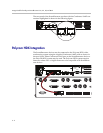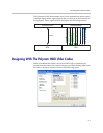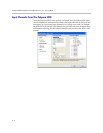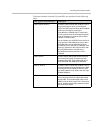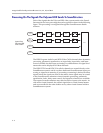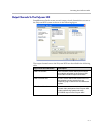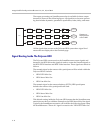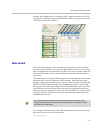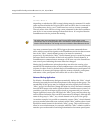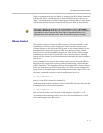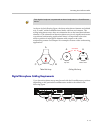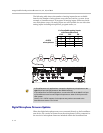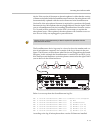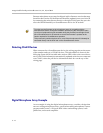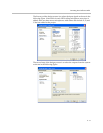
Design Guide for the Polycom SoundStructure C16, C12, C8, and SR12
6 - 10
or
set mute “Mics” 0
depending on whether the HDX system is being muted or unmuted. No audio
paths are muted inside the Polycom HDX when an HDX, that is connected to
a SoundStructure device over CLink2 interface, receives a mute command.
The only effect of the HDX receiving a mute command is that the SoundStruc-
ture device is sent a mute message as described above. It is required that the
SoundStructure device perform the muting.
Any mute command sent to the HDX triggers the mute command shown
above which causes all the signals on the SoundStructure device that are mem-
bers of the “Mics” virtual channel group to be muted or unmuted,
respectively. By default the “Mics” virtual channel group is created by Sound-
Structure Studio and includes all the local microphone virtual channels. A
SoundStructure command status message will be sent out to the SoundStruc-
ture control ports indicating the mute status has changed.
Muting the SoundStructure microphones does not affect the routing of an
attached PSTN telephone caller on the SoundStructure to the remote HDX par-
ticipants. In other words, by default the local SoundStructure participants will
be muted to all remote participants while the remote telephony participants
and remote video participants will still be able to talk to each other.
Advanced Muting Applications
By default, a SoundStructure design automatically defines the “Mics” virtual
channel group and places all the microphones in the design in that group. The
membership of this group may be changed and other signals placed into the
“Mics” group if it is desired to change the behavior of how the mute command
from the HDX maps to the audio signals within a SoundStructure system. It is
possible to put line level input sources (such as program audio) or even the
output signal that is sent to the HDX into the “Mics” group and have those sig-
nals be affected when the Polycom HDX mute status is changed. Although the
name of the group is “Mics”, any virtual channel can be part of the group.
As another example, it is possible to rename the current “Mics” virtual channel
group to another name and create a submix called “Mics” and have that virtual
channel be muted instead of the default “Mics” group. This could be used to
allow in-room reinforcement, for example, while the “Mics” submix would be
muted to prevent that audio from being transmitted to the remote participants.
No audio paths are muted internal to the Polycom HDX system when a mute
command is sent to an HDX system that is connected to a SoundStructure device
over the CLink2 interface. The muting must occur within the SoundStructure device.



